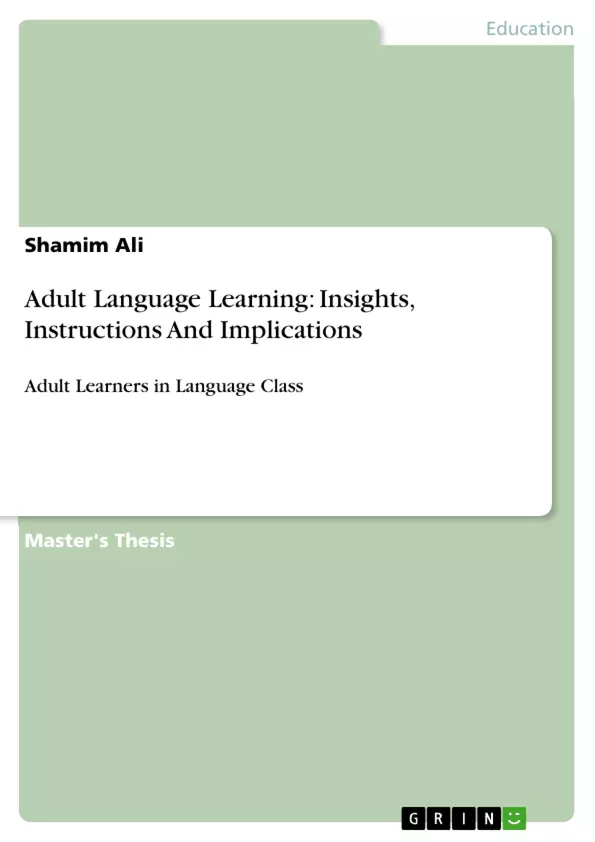The present study aims to investigate, that age is not a detriment to language learning .As young students are biologically disposed to better second language learning, as well as given certain benefits such as lower self-monitor and affective filter ,but at the same time adults are also not at a lower vantage point in L2 learning process. In the language learning program, adult learners bring with them certain advantages. Adults are better at understanding grammatical rules since they are aware of the rules and structures in their own language. [...] Especially in the areas of vocabulary and language structure, adults are actually better language learners than children. Adult learners have more highly developed cognitive systems, are able to make higher order associations and generalizations, and can integrate new language input with their already substantial learning experience. They also rely on long-term memory rather than the short-term memory function used by children and younger learners for rote learning. Adults have already developed learning strategies that have served them well in other contexts. They can use these strategies to their advantage in language learning. This research will suggest ways of dealing better with adult learners in their academic performance in the language class. The researchers' aim will be to investigate that they have potentials to become accomplished language learners with the advantage of more advanced cognitive development in the first language ,and they integrate new language input with their already substantial learning experience. To prove her point of view the researcher will involve 10 teachers and 30 students of Diploma,Certificate and Foundation level at the Department of English (functional Courses) at National University of Modern Languages Islamabad .For assessing adult learners proficiency in the class, questionnaires will be distributed among the participants. Classroom observation are also contributing factor in determining the learning process of adult learners so these tools will be used to find the role and behavior pattern of adult learners .Further it would help language teachers to understand that experience of adult learner is a living text book, and teachers can go through the language programme by cooperating with adult learners.
Table of Contents
- Chapter 1
- Introduction
- Statement of Problem
- Objectives of Research
- Significance of the study
- Hypothesis
- Research Questions
- Research Methodology
- Delimitation
- Chapter 2
- Literature Review
- Chapter 3
- Methodology
- Research Design
- Research Hypotheses
- Participants
- Classroom Observations
- Questionnaires
- Data Analysis
- Chapter 4
- Data Analysis
- Classroom Observation
- Questionnaires
- Chapter 5
- Finding and Recommendations
Objectives and Key Themes
This study aims to investigate the advantages and disadvantages of adult language learning and debunk the misconception that age is a detriment to language acquisition. The research highlights the unique strengths that adults bring to the learning process, arguing that they are not at a disadvantage compared to younger learners.
- The study explores the common perception that younger learners have a biological advantage in language acquisition.
- It examines the cognitive and learning strategies employed by adult learners, demonstrating their strengths and how they differ from those of younger learners.
- The research investigates the potential for adults to become successful language learners, emphasizing the role of cognitive development and prior learning experiences.
- It analyzes the effectiveness of different teaching approaches and learning methods for adult language learners.
- The study explores the value of adult learners' lived experiences as a source of knowledge and insights for educators.
Chapter Summaries
Chapter 1: Introduction provides an overview of the research topic, outlining the problem, research objectives, significance, hypothesis, research questions, methodology, and delimitations of the study.
Chapter 2: Literature Review examines existing research on adult language learning, presenting key findings and theories related to age, cognitive development, learning strategies, and the effectiveness of different teaching approaches.
Chapter 3: Methodology details the research design, participants, data collection methods (including classroom observations and questionnaires), and data analysis techniques employed in the study.
Chapter 4: Data Analysis presents the findings of the study, analyzing the data collected through classroom observations and questionnaires to explore the learning patterns and experiences of adult language learners.
Keywords
Adult language learning, age, cognitive development, learning strategies, teaching approaches, language acquisition, research methodology, classroom observation, questionnaires, data analysis, adult learner experiences.
- Quote paper
- Dr. Shamim Ali (Author), 2006, Adult Language Learning: Insights, Instructions And Implications, Munich, GRIN Verlag, https://www.grin.com/document/171452



